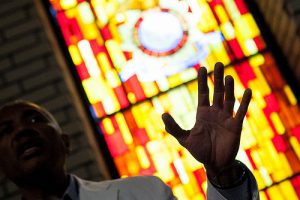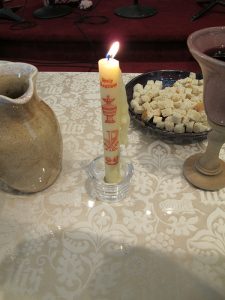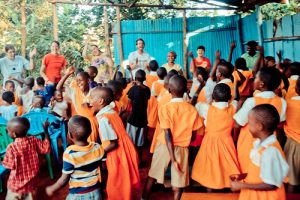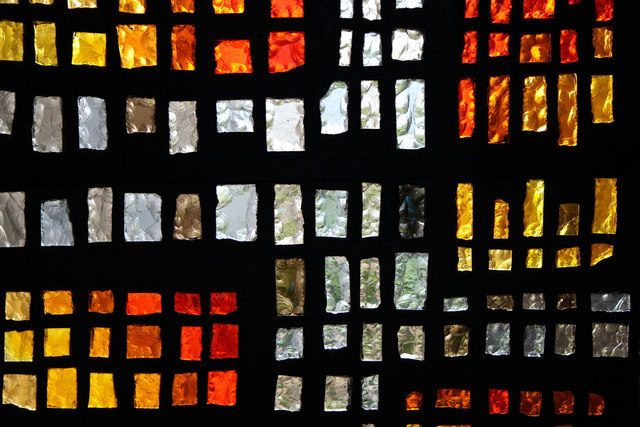Second Sunday of Easter Lectionary Reflection
April 7, 2013
Jesus said to him, “Have you believed because you have seen me? Blessed are those who have not seen and yet have come to believe.” Now Jesus did many other signs in the presence of his disciples, which are not written in this book. But these are written so that you may come to believe that Jesus is the Messiah, the Son of God, and that through believing you may have life in his name. John 20:29-31
Not unlike the early disciples, we gather each week to hear scripture and to encounter Jesus in bread and wine. In our gathering we are strengthened for the journey by sharing the stories of our common faith. Yet even though our faith is held  in common, it finds unique expression in each one of us. Not only is it unique, faith is an organic sort of thing; we don’t control it, we don’t manage it, we experience it. Our faith is not a static thing either. It swells and ebbs like the ocean tide. In the “Introduction to the book of Romans” in his German Bible of 1522, Martin Luther said,
in common, it finds unique expression in each one of us. Not only is it unique, faith is an organic sort of thing; we don’t control it, we don’t manage it, we experience it. Our faith is not a static thing either. It swells and ebbs like the ocean tide. In the “Introduction to the book of Romans” in his German Bible of 1522, Martin Luther said,
Instead, faith is God’s work in us, that changes us and gives new birth from God. (John 1:13). It kills the Old Adam and makes us completely different people. It changes our hearts, our spirits, our thoughts and all our powers. It brings the Holy Spirit with it. Yes, it is a living, creative, active and powerful thing, this faith.
This notion of faith as gift is what makes this particular passage from John’s gospel so meaningful for me. It gives me hope and courage to think of that band of confused, bewildered, and frightened disciples locked in that upper room trying to make sense of the shattered remains of their movement. Things had certainly not gone as they had expected. Their faces were  long, and their hopes were short. And then, just when things were really looking awful Jesus shows up right in their midst proclaiming peace and bestowing the breath of the Spirit on them. Talk about an instant infusion of hope and life!
long, and their hopes were short. And then, just when things were really looking awful Jesus shows up right in their midst proclaiming peace and bestowing the breath of the Spirit on them. Talk about an instant infusion of hope and life!
But Thomas, bless his heart, misses it. He is somewhere else, and he just can’t believe the disciples’ story (Sort of smacks of the empty tomb and the idle tale of Easter’s gospel reading, doesn’t it?). “We have seen the Lord!” Yeah, right. This disciple needs to encounter Jesus up close and personal in order to really believe for himself. Not surprisingly, Jesus shows up again the next week and meets Thomas at this point of need.
The good news is that Jesus is still meeting us today at the point of our greatest need, even when we don’t realize it. Jesus comes to us in the waters of Holy Baptism, bestowing on us that same gift of the Holy Spirit that he gave to the his early disciples. From the moment we encounter that water, word, and wind we are reborn, and a lifelong work of change is ignited in us. We may walk for years in a state of doubt, disbelief, or discouragement, but that Spirit is still at work within us kindling faith, instilling peace, and dispensing mercy and grace.
Like Thomas, many of us have our “My Lord and my God” moment when we least expect it. It may not happen like a bolt of lightning in a rainstorm ala Luther, and we may not be blinded by the light of Christ (as Paul was), but we may suddenly find ourselves  drawn into a deeper relationship with God and a community of faith. We may encounter God in relationship with a modern day disciple. We may see Jesus in the face of a stranger. The point is this: God is active in the world, Jesus continues to be revealed, the winds of the Spirit still blow, and that is very good news indeed.
drawn into a deeper relationship with God and a community of faith. We may encounter God in relationship with a modern day disciple. We may see Jesus in the face of a stranger. The point is this: God is active in the world, Jesus continues to be revealed, the winds of the Spirit still blow, and that is very good news indeed.
This is why, dear friend, we will continue to gather no matter what the world throws our way. This is why we tell the stories of faith again and again and again. This is why we must make a place at the table for all people–those who doubt and those who don’t. For it is in the sacred space of community and relationship that we may come to believe, and believing we may indeed experience life as God intends. May peace be with you this week and always–in the name of Christ.
In Worship
Consider either moving the psalm to the beginning of worship or using part of it as a responsive call to worship.
With Youth
What about this whole “peace” thing in today’s gospel reading. Jesus comes to the disciples and brings a greeting of peace. Not only that–he sends them out in peace, just as his Father has sent him. Talk with youth about the passing of the peace (if you do that in your congregation). Ask youth to consider what it means to be sent into the world in peace. How are we challenged to live, think, and be as God’s people of peace? What does it mean to be a people who practice forgiveness and reconciliation? Finally, what might it mean to have life in the name of Christ? These are important questions to ask, to talk about, to pray about, and to wrestle with. I truly believe that our youth are capable of dealing with deep questions of faith if we will entrust such a task to them and accompany them on the journey.
With Children
The Lord’s Day is Every Day!
The reading from Psalm 118 appointed for this Sunday is too good to pass up! We start almost every worship service with the words of verse 24: “This is the day that the Lord has made; let us rejoice and be glad in it.” Talk to the children about why these words are so important and why they provide a good way to call God’s people to worship. Then remind them that EVERY day is the day that the Lord has made. We should be joyous and glad every day. Consider giving them a small banner or coloring sheet with this verse on it, and challenge them to begin each day of the coming week by saying these words. Ask them how they think the world might change if everybody did that every single morning. What a difference this one sentence might make!
Photos: Christine Matthews, Salvation Army USA West, Bill McChesney, and Mac Mitchell used under Creative Commons License. Thanks!




Leave a Reply